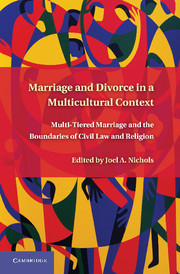 Marriage and Divorce in a Multi-Cultural Context
Marriage and Divorce in a Multi-Cultural Context Published online by Cambridge University Press: 05 November 2011
Western democracies in recent years have witnessed dramatic (and often highly charged) debates regarding Islamic law, women, and the limits of pluralism in a liberal polity. Perhaps the most relevant of these for the issue of family law pluralism was the “Shari‘a Arbitration controversy” of Ontario, Canada, of 2004–2005. Although Jewish, Christian, and Isma‘ili Muslim (a relatively small sect of Shi‘a Muslims who follow the Agha Khan) residents of Ontario had long made use of private arbitration for the resolution of intracommunal family disputes, when a group of Sunni Muslims announced their intent to establish a mechanism to allow orthodox Muslims to arbitrate their family law disputes in accordance with their understanding of Islamic law, a transatlantic controversy erupted that was resolved only when Ontario took the drastic step of prohibiting the arbitration of all family law disputes in which the arbitrator purported to apply non-Canadian law. Great Britain, too, experienced its own moment of Islamic law anxiety when the Archbishop of Canterbury suggested that British commitments to pluralism might require the English legal system to recognize certain aspects of Islamic law. That controversy was subsequently heightened when it was revealed that British Muslims had already set up judicial councils that engaged in legally binding arbitration of family law disputes pursuant to British law permitting binding arbitration.
Given the general anxiety surrounding Islamic law in Western democracies, the fact that fear of Islamic law should be a substantial stumbling block to increasing legal pluralism in the domain of family law is ironic given the pluralistic nature of Islamic law’s regulation of the family. At the same time, legal recognition of family law pluralism is not without its genuine risks: The rules of Islamic family law, as well as the rules and traditions of other subcommunities within a liberal polity, are not substantively equivalent to the generally applicable rules of civil law. Any system of family law pluralism within a liberal polity, therefore, must establish institutional mechanisms to ensure that legal pluralism does not become a tool to deprive individuals of their rights as citizens.
To save this book to your Kindle, first ensure no-reply@cambridge.org is added to your Approved Personal Document E-mail List under your Personal Document Settings on the Manage Your Content and Devices page of your Amazon account. Then enter the ‘name’ part of your Kindle email address below. Find out more about saving to your Kindle.
Note you can select to save to either the @free.kindle.com or @kindle.com variations. ‘@free.kindle.com’ emails are free but can only be saved to your device when it is connected to wi-fi. ‘@kindle.com’ emails can be delivered even when you are not connected to wi-fi, but note that service fees apply.
Find out more about the Kindle Personal Document Service.
To save content items to your account, please confirm that you agree to abide by our usage policies. If this is the first time you use this feature, you will be asked to authorise Cambridge Core to connect with your account. Find out more about saving content to Dropbox.
To save content items to your account, please confirm that you agree to abide by our usage policies. If this is the first time you use this feature, you will be asked to authorise Cambridge Core to connect with your account. Find out more about saving content to Google Drive.